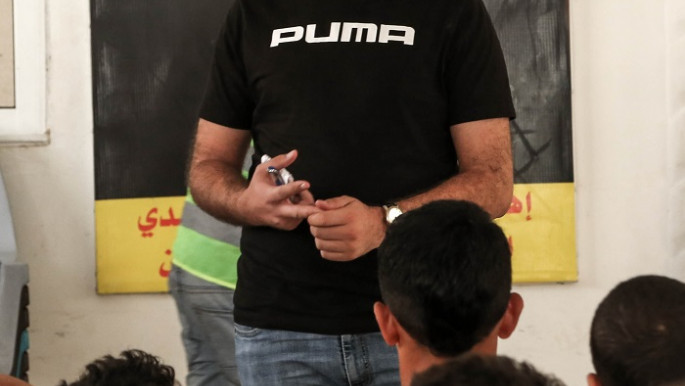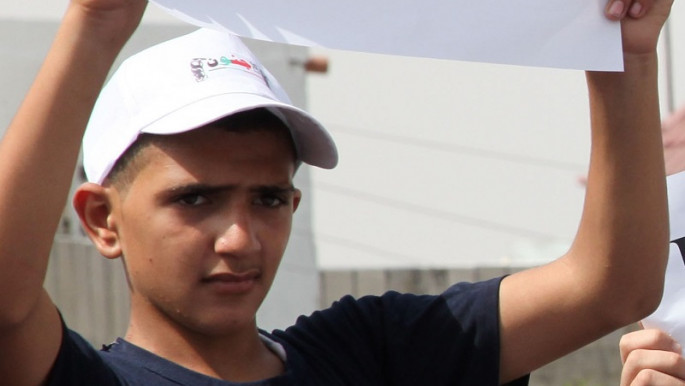I Learn: Jordanian activists bring education to 'left-behind' children
I Learn: Jordanian activists bring education to 'left-behind' children
Feature: The state of formal education, especially in rural areas of Jordan and among the huge refugee population, has prompted activists to launch programmes focusing on disadvantaged children.
4 min read
Both Jordan and Lebanon have struggled to deliver education to refugee children [Raneem AlDadoud]
Halfway between the Jordanian capital, Amman, and the Syrian border, the city of Jerash hosts a large number of Syrian refugees. Jerash is also home to the Gaza camp, home to some 24,000 Palestinian refugees who were driven out by Israel from the Gaza Strip in the wake of the 1967 war.
According to the Joint Education Needs Assessment report released by UNICEF in March, nearly 40 percent of school-aged Syrian refugee children across Jordan are not attending formal education.
Although the enrolment figures among Palestinian refugee children, who have been in the country for much longer than their Syrian peers, are far better, the drop-out figures are still alarming, according to another UNICEF report.
In rural Jordan, poor quality education is a barrier that is "reinforced by inefficient educational resources," said a report by the Middle East and North Africa Out-of-School Children Initiative.
The report pointed out that the percentage of 5-to-15 year old children who are out of school in the country, excluding Syrian refugees, is about 46.3 percent.
The state of formal education in Jerash is part of this picture, affecting Jordanian, Palestinian and Syrian school-age children alike.
To help these "left-behind children", Saddam Sayyaleh, an education activist and native of Jerash with a long history in education-related volunteer work, founded I Learn, a pro-bono informal education-based initiative.
According to the Joint Education Needs Assessment report released by UNICEF in March, nearly 40 percent of school-aged Syrian refugee children across Jordan are not attending formal education.
Although the enrolment figures among Palestinian refugee children, who have been in the country for much longer than their Syrian peers, are far better, the drop-out figures are still alarming, according to another UNICEF report.
In rural Jordan, poor quality education is a barrier that is "reinforced by inefficient educational resources," said a report by the Middle East and North Africa Out-of-School Children Initiative.
 |
|
| Sayyaleh's initiative seeks to plug gaps left by formal education [Raneem AlDaoud] |
The report pointed out that the percentage of 5-to-15 year old children who are out of school in the country, excluding Syrian refugees, is about 46.3 percent.
The state of formal education in Jerash is part of this picture, affecting Jordanian, Palestinian and Syrian school-age children alike.
To help these "left-behind children", Saddam Sayyaleh, an education activist and native of Jerash with a long history in education-related volunteer work, founded I Learn, a pro-bono informal education-based initiative.
Speaking to al-Araby al-Jadeed via Skype, Sayyaleh said the majority of students in his programme were Syrian refugees who are not registered with the UNHCR, the rest Jordanians from Jaresh and rural areas, and Palestinians.
Formal, non-formal and informal education
There is no shortage of initiatives and programmes focusing on formal education and non-formal education - which follows a structured Ministry of Education curriculum - in Jordan. But the activist behind I Learn stresses that there are children and even young adults who, for various reasons, are not benefiting.
This is where his programme comes in. I Learn focuses on enrolled children and youths (6-21 years old) who are at high risk of dropping out, as well as those who have already dropped-out.
Other beneficiaries include orphans, dyslexic children and even children who are - illegally - in work and who want to have a path back to formal or non-formal education, including vocational training.
Sayyaleh says that informal education is no substitute for formal education, but that by providing students with the skills they themselves request, including English, Arabic, literacy and math skills, and even art, music and drama, the programme empowers them to improve their conditions and facilitates their transition back to education.
In one case he cited, I Learn helped a student, at his request, learn skills to successfully take an official test to obtain a work permit. Sayyaleh says the idea is giving "left-behind" children and youths options in life, and help them realise they are not doomed to work in the streets.
The Jordanian activist says that this tailored education plugs gaps in formal and non-formal education, whose approach, he readily admits, may not work for all students.
I Learn holds "introductory sessions," during which each attendee is asked about his or her specific needs. After that, students attend regular sessions, until their learning objectives are met.
 |
|
| There has been a dearth of funding for education NGOs and organisations[AFP] |
Sayyaleh is also proud of what he says I Learn is doing on the gender equality front. He says that after a few sessions, many girls in his programme felt empowered and obtained a voice of their own, speaking out about their needs and not letting boys set the tone of the sessions without their input.
Teething problems
According to Sayyaleh, the programme has so far directly helped up to 350 students, and up to 750 other beneficiaries indirectly, including families and members of the wider community.
Yet, despite its initial success, I Learn, which operates under the umbrella of the Science League education NGO, has faced problems raising funds to sustain and expand the programme.
So far, Sayyaleh has self-funded the initiative from his own savings. The programme is run primarily by volunteers, and holds its activities in donated venues.
But the programme needs further funding for training, certification and expansion, including setting up shop in Zaatari, the largest camp for Syrian refugees in the kingdom.
Before I Learn was endorsed by the Science League, Sayyaleh tried unsuccessfully to obtain funding via UNICEF.
Recently, Sayyaleh was selected as one of 20 BADIR fellows, which he hopes will help him gather support for his initiative.
BADIR, Arabic for "Take the Initiative", is a five-year programme run in partnership with the International Youth Foundation (IYF) and Starbucks, and is designed to equip Jordanian social entrepreneurs with the knowledge and skills they need to strengthen and scale up their projects.
Sayyaleh's passion and I Learn's approach and target demographic set it apart from a long list of NGOs involved in the field that have achieved mixed results.
With better support, local Jordanian activists are better able to connect with Jordanian, Palestinian and Syrian youths than foreign workers, and are more likely to be familiar with the needs of their local communities.



